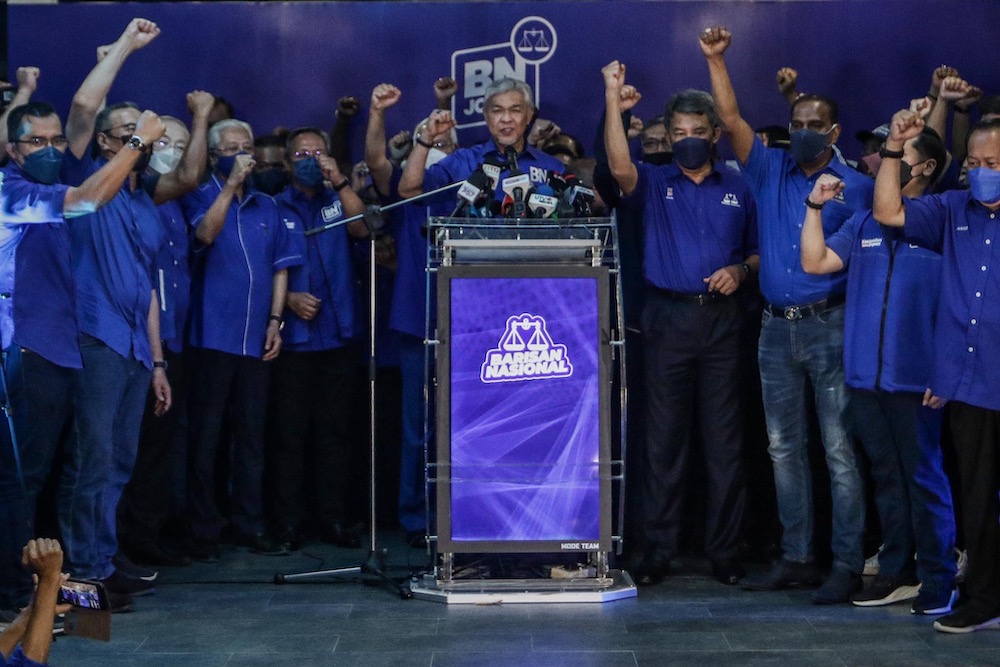JOHOR BARU, March 13 — Datuk Hasni Mohammad’s clean image, an efficient party machinery and division among the opposition are the main factors that led to Barisan Nasional’s two-third majority victory in yesterday’s Johor state election.
The strong mandate given to the coalition represents a good avenue for BN to form a stable government and the opportunity to redeem its pride.
BN not only grabbed 40 out of the 56 contested seats but recaptured seats it had lost during the 14th General Election (GE14) through its component parties, Umno, MIC and MCA.
Political analyst Mujibu Abd Muis said BN’s victory was expected especially when faced with a divided opposition that resulted in split votes among them.
“BN’s advantage lies in the strength of its grassroots. Grassroots voters continue giving their support and there was no real challenge from the opposition. Although there were forays made in Felda (With various issues), it still was manageable as BN retained many Felda seats,” he told Bernama here today.
The Negri Sembilan Universiti Teknologi MARA (UiTM) Faculty of Administrative Science and Policy Studies senior lecturer said although BN won comfortably, it would need a reality check as many things need to be done before the upcoming 15th General Election (GE15).
The important thing is that BN’s momentous victory in the Johor election will place it on the right track leading into GE15 with all eyes now focused on the Umno General Assembly scheduled to begin this Wednesday (March 16), Mujibu said.
Meanwhile sociopolitical analyst Assoc Prof Dr Awang Azman Awang Pawi said the Umno machinery, which was more efficient and systematic, contributed to BN’s victory.
“Besides that, Hasni Mohammad who has clearly been successful in his administration, and not associated to any negative issues, was declared as BN’s choice for Mentri Besar, while the opposition failed to name their choice, all of which provided an advantage to BN.
“Hasni was also seen to have a grand vision for Johor and this was strengthened by the fact that he was the incumbent MB, which translated into BN’s success at the polls,” he said.
For election analyst Dr G. Manimaran, the results showed that voters had the power in determining the fate of political parties.
“Today, we (voters) give the mandate, if the mandate is unfulfilled, we vote others in.
“I also noticed that a drop in votes for opposition parties like Pakatan Harapan (PH) compared to GE14. On average in the 56 seats, the drop in votes for PH is between 200,000 to 300,000 votes,” the former Electoral Reform Committee member said.
Political analyst Dr Che Hamdan Che Mohd Razali meanwhile said Umno and BN need to work to convince voters about their commitment to have leaders with integrity, especially since voters in the Johor polls made their choices in a democratic environment.
The UiTM Pahang Branch Faculty of Administrative Science and Policy Studies senior lecturer said although voter turnout was low, if the BN machinery did not work hard to ensure regular voters and party members voted, they would not have gotten such a big win.
“To me, BN learned quickly from their mistakes and identified their weak areas. What is greatly hoped for is the need to ensure the public’s welfare and to continue to take care of the wellbeing of those affected by economic problems and the rising costs in living standards,” he said.
Out of the 40 seats won by BN, Umno won 33 seats, MCA four and MIC three, compared to GE14, where BN only secured 19 seats (Umno 17 seats, MIC two).
The coalition also managed to retake Pemanis, Kemelah, Bekok, Tenang, Bukit Pasir, Gambir, Serom, Bukit Naning, Semerah, Yong Peng, Parit Yaani, Senggarang, Mahkota, Paloh, Tiram, Permas, Larkin, Kempas, Kota Iskandar, Bukit Permai, Pulai Sebatang and Pekan Nanas.
The remaining seats were won by PH (11), Perikatan Nasional (PN) (three), PKR and the Malaysian United Democratic Alliance (Muda) (one seat each).
BN also got 43.11 per cent of the popular vote, followed by PN with 24.04 per cent, PH 20.48 per cent, and 85 candidates from the 239 who contested lost their deposits.
The highest majority, 13,943 votes, was recorded in Skudai, which was won by Marina Ibrahim of PH, while the smallest majority, 137 votes, was recorded in Bukit Batu, the sole seat won by PKR.
Also, Muda secretary-general Amira Aisya Abd Aziz created history for her party when she won Muda’s first seat at Puteri Wangsa in the party’s first electoral outing.
The Johor polls saw participation from several new parties, including Muda, Parti Pejuang Tanah Air (Pejuang) and Parti Bangsa Malaysia (PBM) as well as Parti Warisan, which contested outside Sabah for the first time. — Bernama



















